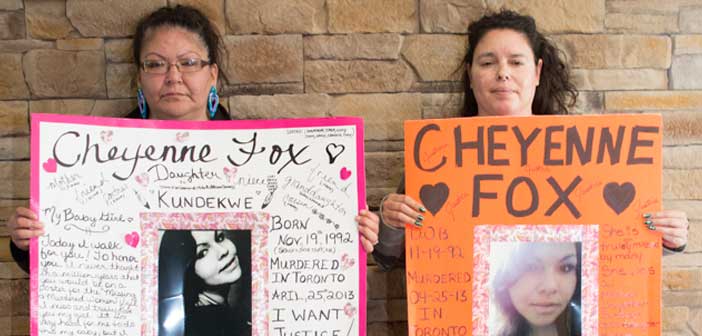Allege race and gender led to her death
TORONTO—The family of the late Cheyenne Fox — a young First Nations woman whose family hails from the Wikwemikong First Nation—had lawyers file a statement of claim on behalf of her estate with the Superior Court of Justice against the Toronto Police Services Board (TPSB), the Attorney General of Canada and others last week.
Ms. Fox died tragically on April 25, 2013. In an interview with Ms. Fox’s mother Michelle Atkinson last year, she explained that her daughter was recruited into the sex trade at the age of 20.
“Both her dad and I, we know she didn’t do this,” Ms. Atkinson told The Expositor.
“She was so naïve, she didn’t think things through,” her mother said. “Cheyenne was very protected growing up. She was very loved. She was very lively—had a crazy, funny sense of humour. She was so loved.”
“She had no reason to commit suicide,” Ms. Atkinson added. “They say she tried to commit suicide, but I know that’s not true.”
She said the police officer she spoke to following Cheyenne’s death was rude to her and flippant of her daughter’s death.
“‘Well, do you know she was a prostitute and she was on drugs?’” the officer reportedly said. “‘It is what it is.’”
“I was extremely shocked, I just hung up,” Ms. Atkinson said. “I felt like I was completely disregarded. They aren’t taking it serious.”
“I want justice for my baby ‘cause Toronto won’t do nothing,” she said. “I need justice and peace that my daughter has gone to the spirit world, peacefully.”
The statement of claim states that Ms. Fox was a victim of human traffickers who befriended her and exploited the fact “that she was a vulnerable young Indian woman. The intent of the human traffickers was to convert Cheyenne into an involuntary sex trade worker for the benefit of the individuals who ran a human trafficking circle.”
The statement also states that the other defendants named, Toronto Police Services Board and the Attorney General of Canada, “Know that Indian women involved in the survival sex trade are particularly vulnerable to violence.”
On the night of April 25, 2013, Cheyenne met with friends, as well as individuals believed to be human traffickers, at a hotel bar where they consumed excessive amounts of alcohol, according to the statement of claim. During a cab ride, Ms. Fox was allegedly assaulted by the taxi driver, causing her to leap from the moving vehicle on Highway 401. This act caught the attention of other drivers who called 911 to alert police to the situation and for fear of the young woman’s safety. She was then picked up by two individuals who had seen what had happened and who drove her to her original destination.
“Members of the TPSB arrived at 80 Harrison Boulevard, Toronto, Ontario to collect the badly beaten and lifeless body of Cheyenne at approximately 11:10 pm on April 25, 2013,” the statement of claim read.
The statement of claim pleads that the TPSB was negligent in its response and investigation to the 911 calls; that the board owed a duty of care to Cheyenne and refused or neglected to adequately or effectively police the circumstances leading to her death; and that the TPSB breached the applicable standard of care which led to her death.
The claim goes on to state that the TPSB, “blamed Cheyenne for her death attributing ‘risky’ behaviour and ‘high risk lifestyle’ instead of engaging an adequate or effective policing strategy to protect vulnerable women.”
The plaintiff also pleads that the “Attorney General of Canada has failed in its responsibility to promote a society in which all are secure in the knowledge that they are recognized at law as human beings equally deserving of concern, respect and consideration contrary to its Constitutional obligations” and that differential treatment based on her race, sex and ethnic gender resulted, or contributed, to her death.
Ms. Fox leaves behind a five-year-old son who lives with his grandmother on the Sheguiandah First Nation and who misses his mother every day, Ms. Atkinson said.




